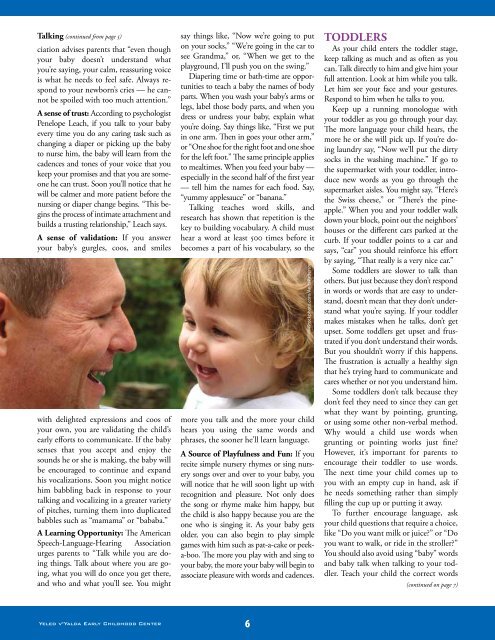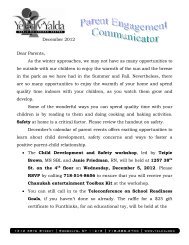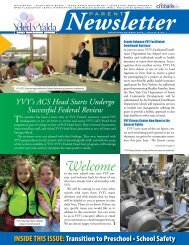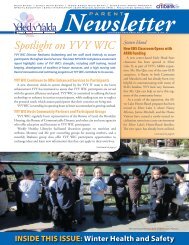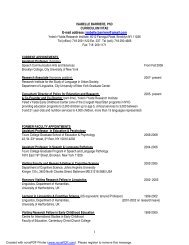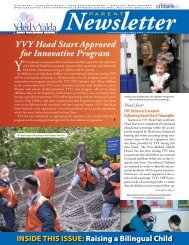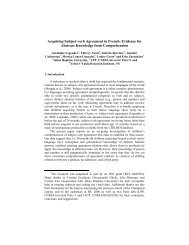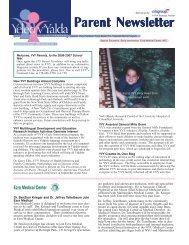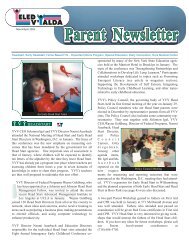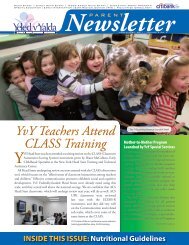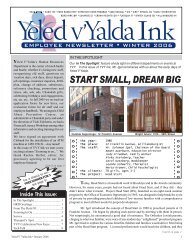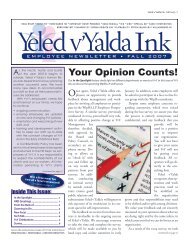Head Start - Yeled.org
Head Start - Yeled.org
Head Start - Yeled.org
You also want an ePaper? Increase the reach of your titles
YUMPU automatically turns print PDFs into web optimized ePapers that Google loves.
Talking (continued from page 5)<br />
ciation advises parents that “even though<br />
your baby doesn’t understand what<br />
you’re saying, your calm, reassuring voice<br />
is what he needs to feel safe. Always respond<br />
to your newborn’s cries — he cannot<br />
be spoiled with too much attention.”<br />
A sense of trust: According to psychologist<br />
Penelope Leach, if you talk to your baby<br />
every time you do any caring task such as<br />
changing a diaper or picking up the baby<br />
to nurse him, the baby will learn from the<br />
cadences and tones of your voice that you<br />
keep your promises and that you are someone<br />
he can trust. Soon you’ll notice that he<br />
will be calmer and more patient before the<br />
nursing or diaper change begins. “This begins<br />
the process of intimate attachment and<br />
builds a trusting relationship,” Leach says.<br />
A sense of validation: If you answer<br />
your baby’s gurgles, coos, and smiles<br />
with delighted expressions and coos of<br />
your own, you are validating the child’s<br />
early efforts to communicate. If the baby<br />
senses that you accept and enjoy the<br />
sounds he or she is making, the baby will<br />
be encouraged to continue and expand<br />
his vocalizations. Soon you might notice<br />
him babbling back in response to your<br />
talking and vocalizing in a greater variety<br />
of pitches, turning them into duplicated<br />
babbles such as “mamama” or “bababa.”<br />
A Learning Opportunity: The American<br />
Speech-Language-Hearing Association<br />
urges parents to “Talk while you are doing<br />
things. Talk about where you are going,<br />
what you will do once you get there,<br />
and who and what you’ll see. You might<br />
say things like, “Now we’re going to put<br />
on your socks,” “We’re going in the car to<br />
see Grandma,” or, “When we get to the<br />
playground, I’ll push you on the swing.”<br />
Diapering time or bath-time are opportunities<br />
to teach a baby the names of body<br />
parts. When you wash your baby’s arms or<br />
legs, label those body parts, and when you<br />
dress or undress your baby, explain what<br />
you’re doing. Say things like, “First we put<br />
in one arm. Then in goes your other arm,”<br />
or “One shoe for the right foot and one shoe<br />
for the left foot.” The same principle applies<br />
to mealtimes. When you feed your baby —<br />
especially in the second half of the first year<br />
— tell him the names for each food. Say,<br />
“yummy applesauce” or “banana.”<br />
Talking teaches word skills, and<br />
research has shown that repetition is the<br />
key to building vocabulary. A child must<br />
hear a word at least 500 times before it<br />
becomes a part of his vocabulary, so the<br />
more you talk and the more your child<br />
hears you using the same words and<br />
phrases, the sooner he’ll learn language.<br />
A Source of Playfulness and Fun: If you<br />
recite simple nursery rhymes or sing nursery<br />
songs over and over to your baby, you<br />
will notice that he will soon light up with<br />
recognition and pleasure. Not only does<br />
the song or rhyme make him happy, but<br />
the child is also happy because you are the<br />
one who is singing it. As your baby gets<br />
older, you can also begin to play simple<br />
games with him such as pat-a-cake or peeka-boo.<br />
The more you play with and sing to<br />
your baby, the more your baby will begin to<br />
associate pleasure with words and cadences.<br />
©iStockphoto.com/AnitaPatterson<br />
Toddlers<br />
As your child enters the toddler stage,<br />
keep talking as much and as often as you<br />
can. Talk directly to him and give him your<br />
full attention. Look at him while you talk.<br />
Let him see your face and your gestures.<br />
Respond to him when he talks to you.<br />
Keep up a running monologue with<br />
your toddler as you go through your day.<br />
The more language your child hears, the<br />
more he or she will pick up. If you’re doing<br />
laundry say, “Now we’ll put the dirty<br />
socks in the washing machine.” If go to<br />
the supermarket with your toddler, introduce<br />
new words as you go through the<br />
supermarket aisles. You might say, “Here’s<br />
the Swiss cheese,” or “There’s the pineapple.”<br />
When you and your toddler walk<br />
down your block, point out the neighbors’<br />
houses or the different cars parked at the<br />
curb. If your toddler points to a car and<br />
says, “car” you should reinforce his effort<br />
by saying, “That really is a very nice car.”<br />
Some toddlers are slower to talk than<br />
others. But just because they don’t respond<br />
in words or words that are easy to understand,<br />
doesn’t mean that they don’t understand<br />
what you’re saying. If your toddler<br />
makes mistakes when he talks, don’t get<br />
upset. Some toddlers get upset and frustrated<br />
if you don’t understand their words.<br />
But you shouldn’t worry if this happens.<br />
The frustration is actually a healthy sign<br />
that he’s trying hard to communicate and<br />
cares whether or not you understand him.<br />
Some toddlers don’t talk because they<br />
don’t feel they need to since they can get<br />
what they want by pointing, grunting,<br />
or using some other non-verbal method.<br />
Why would a child use words when<br />
grunting or pointing works just fine?<br />
However, it’s important for parents to<br />
encourage their toddler to use words.<br />
The next time your child comes up to<br />
you with an empty cup in hand, ask if<br />
he needs something rather than simply<br />
filling the cup up or putting it away.<br />
To further encourage language, ask<br />
your child questions that require a choice,<br />
like “Do you want milk or juice?” or “Do<br />
you want to walk, or ride in the stroller?”<br />
You should also avoid using “baby” words<br />
and baby talk when talking to your toddler.<br />
Teach your child the correct words<br />
(continued on page 7)<br />
<strong>Yeled</strong> v’Yalda Early Childhood Center<br />
6


